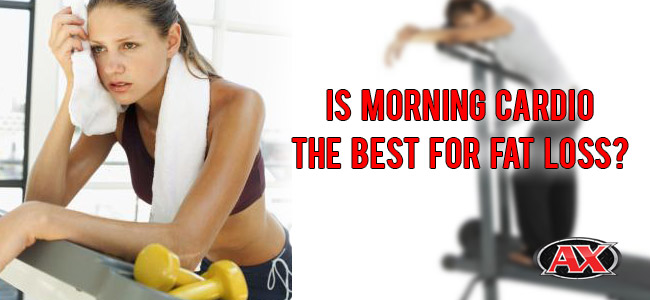
It’s like clockwork. People have a standard routine of a 5-day split and morning cardio. It’s something that must not be strayed from or you’ll suffer the consequences. However, not everyone does fasted cardio. Are they onto something or simply “on” something? What is the deal with morning cardio? Why can’t you eat first? Is it the best approach to fat loss? We see all sorts of people doing it, but are they simply following the herd? Step off of the treadmill, it’s time for some AXtreme knowledge.
Fasted cardio?
Morning cardio, fasted cardio, etc. It is known by various names, but it implies the same thing. That you must perform low (to moderate) intensity cardio first thing in the morning before breakfast. We’ve seen all of the videos of various bodybuilders preaching morning cardio while watching them on their stepmill. The goal is to burn as much fat as possible. The thought is that your body is in a fasted state so it has no choice but to burn fat. Low intensity cardio also preferentially burns a higher portion of fats versus glycogen. It all sounds so promising.
There are diets that are coming to light that incorporate similar principles. Intermittent fasting diets are becoming quite common. You eat an abundance of calories before a long term fast. In some cases you may perform exercise during this fasted state. The premise is that cavemen and men of yesteryear did not always have food available. When they did, they would feast. Some have seen great results with these types of diets. However, others tend to see less than favorable results. The same situation occurs with fasted cardio. Some people see fantastic results, whereas others see their muscle wasting away.
Low Intensity vs. High Intensity
It is true that you will preferentially use fats during low intensity exercise. However, this is a short term progress chart. Let’s say you burn 300 calories in a 30 minute cardio session using low intensity. Your body may burn some calories after that workout due to EPOC (excess post-exercise oxygen consumption). Let’s say in a 15 minute HIIT (High Intensity Interval Training) session you burn 150 calories (normally you should burn more than this). However, the amount of calories you burn due to EPOC is much greater for HIIT sessions. You can burn calories for up to 24 hours after an HIIT session.
Now, it would be easier on your body to perform the low intensity sessions, especially since several consecutive HIIT sessions is unlikely. However, the resulting caloric burn from the few HIIT sessions would offer the same results as several low intensity sessions. You burn calories during and after the session with HIIT. This means less frequent cardio sessions. Your body will also have more time to recover.
Why does this all matter?
Well, the good thing about HIIT is that it has no special constraints. You can do your HIIT sessions after your workout (ideally), mid-day, or at any time if you prefer (steer clear of doing it in a fasted state in the morning). You do not have to train your body while it is already depleted and devoid of energy. You are better able to preserve muscle also. Assuming that the body will purely burn fat during morning cardio is insane. The body utilizes various fuel sources during exercise, even when depleted. Remember that your body is very smart and knows how to self-regulate. If you do not provide it energy, yet you request it to provide enough energy to perform cardio, it will find that energy. That energy will not solely be coming from fat, but at an almost equal rate of fat and muscle.
Here’s the challenge. Say I just pissed you off by telling you that morning cardio is burning your precious muscle. Swap your morning cardio with HIIT sessions. Instead of a 45 minute low intensity session, perform a 15-20 minute HIIT session. See how your body responds. I can bet the results will be favorable. Look at it this way, you can sleep in a bit longer in the a.m. now!










